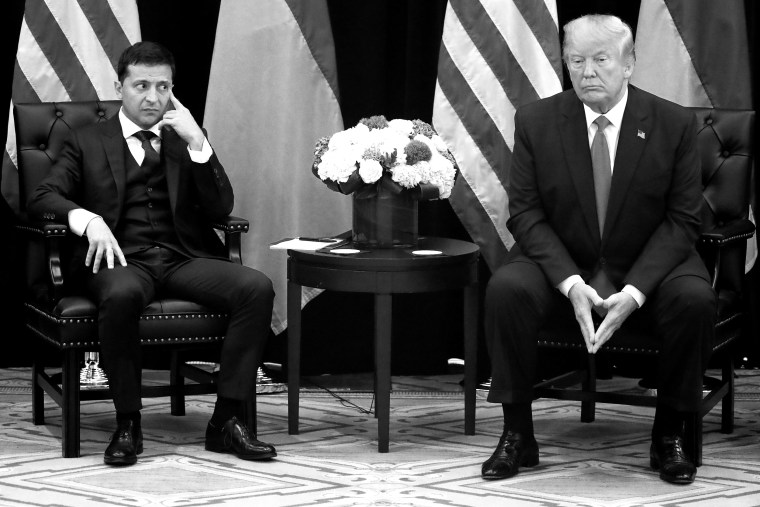On Tuesday, Bill Taylor, the top U.S. diplomat in Ukraine, gave what House Democrats described as "disturbing" testimony about President Donald Trump's Ukraine dealings. The testimony was not open to the public, but news outlets obtained and subsequently published Taylor’s 15-page opening statement.
Taylor’s statement makes clear that Trump did indeed pressure Ukraine to launch an investigation into former Vice President Joe Biden. It’s an abuse of power and a flagrant attempt to use the office of the presidency for personal gain. But as both Taylor’s statement and Ambassador Gordon Sondland’s statements to Congress also make clear, Trump wants the issue framed in terms of bribery (a crime) instead of abuse of power.
Trump can (and has) said repeatedly there was “no quid pro quo” — but Trump’s abuse of power is on full display for anyone to see.
Why? Because bribery — like all crimes — is hard to prove. Each element of the crime must be proven beyond a reasonable doubt. Trump can (and has) said repeatedly there was “no quid pro quo” — but Trump’s abuse of power is on full display for anyone to see.
On Sept. 9, 2019, Taylor wrote to Sondland: “As I said on the phone, I think it’s crazy to withhold security assistance for help with a political campaign.” Before responding, Sondland called Trump and asked, “What do you want from Ukraine?” Trump responded, “Nothing. There is no quid pro quo.” During the course of the short conversation, Trump repeated “no quid pro quo” multiple times.
Note that Trump was the first to mention “quid pro quo.” Now, it’s the phrase on everyone’s lips. “No Quid pro quo,” is the new “No Collusion!”
To complicate matters, Trump — and almost everyone else — uses the phrase “quid pro quo” incorrectly. People seem to think that “quid pro quo” means “bribery.” Nope. Quid pro quo is only one element of bribery. There’s nothing intrinsically wrong with quid pro quo, which simply means exchange of value. Without also proving the other elements of bribery, there is no harm.
Tellingly, this is the same strategy Trump used to try to discredit the Mueller report — what we might call the “No Collusion” trick. It went something like this:
Step 1: Trump positioned the goal posts where he wanted them by repeating “No Collusion!”
Step 2: People took the bait by responding “Yes, collusion!” and pointing out the evidence discovered by Mueller and investigators.
Step 3: Trump delayed and obstructed the Mueller investigation.
Step 4: When Mueller was unable to obtain evidence to prove each element of criminal conspiracy beyond a reasonable doubt, Trump declared himself “completely exonerated.”
Ultimately, Trump skated through the Russian scandal essentially unscathed, despite the fact that Mueller documented multiple instances of potential obstruction of justice and numerous contacts and points of coordination between the Trump campaign and the Russians.
Now Trump is trying the same trick.
Sondland's and Taylor’s statements demonstrate that Trump started working on step one early in September. He began positioning the goal posts by repeating “no quid pro quo” in both public and private. Trump’s surrogates then got into the act. Sen. Lindsey Graham, for example, said that he would support impeachment if the inquiry established quid pro quo.
Next, Trump enlisted several members of his administration to help him with step three: obstructing the inquiry and making sure Congress can’t get enough “evidence” to prove the “crime.” Members of the State Department and White House officials have openly refused to comply with congressional subpoenas.
So will Trump be successful? His trick could work again — unless people keep focused on what matters. Quid pro quo is irrelevant. It’s completely beside the point. It muddies the waters.
If you really want to pick a crime, extortion more closely describes the president’s behavior in pressuring the Ukrainian president. (Extortion is getting something of value by putting someone in fear. Threatening to withhold military aid created fear, thus fulfilling the definition of extortion.)
But impeachment isn’t about the federal criminal code, as much as Trump wants it to be. Impeachment is about abuse of power. Impeachment is about trading foreign policy for personal gain. Trump’s behavior — pressuring a foreign government to launch a sham investigation into a political rival for the purpose of disrupting a U.S. presidential election — is precisely the kind of self-dealing behavior the framers of the Constitution had in mind when they crafted the impeachment clause.
Quid pro quo is a distraction.

